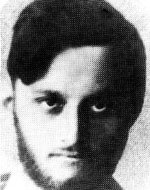Feinberg, Avshalom
Son of Fanny and Israel, was born on October 23, 1889 in Gedera. His mother was one of the three women who immigrated to Israel with the first Biluim groups and his father was one of the founders of Rishon LeZion, and his parents moved to Rishon Le Zion and joined the Biluim families in Gedera, where his father was one of the founders. They instilled in Avshalom the love for the Bible, the dedication to the Land of Israel and the belief in the redemption of the people in its land. Avshalom studied at a school in Jaffa and Rishon Letzion. He was an outstanding student. Since there were no high schools in Israel at that time, Avshalom was sent to a high school in France in 1904. Five years later he returned to Hadera and at that time met the agronomist Aharon Aharonson, who discovered the “mother of wheat,” who founded the station in Atlit and set up a branch in Hadera. Thanks to their shared love for agriculture and the country, a friendship was established between Avshalom Aharon and Avshalom Monet to serve as the manager of the attempts station in Hadera and then the station secretary in Atlit. He devoted himself passionately to nurturing the station, conducted trips and tours in Israel, Syria and Lebanon, added his knowledge and experience and was able to exploit these to promote the work of the station. At the same time, he realized that the British should be helped to conquer the Land of Israel from the Turks on the assumption that the liberated land would be handed over to the Jewish people. In 1915 he wrote to Henrietta Szold: “I express not only my desire but also my friend’s desire for Turkey’s defeat and the sooner it is in our favor.” He also hoped and prayed for the defeat of Germany and resented what he saw as shortsightedness on the part of the pro-Germans in the Yishuv. At the beginning of 1915, Avshalom presented his ideas to Aharon Aharonson and they began to devise lines of action. Avshalom disguised himself as a refugee and boarded a ship that had come to Palestine to transfer refugees. He arrived in Alexandria and managed to contact the British military intelligence, detailing his plan – setting up an intelligence network to operate in Palestine and transmitting its findings to British headquarters. They accepted his plan and determined the tasks that would be imposed on the network. When the officer asked how much money the network would demand for the service, Avshalom replied that they would work for a single goal – the Jewish national goal. Avshalm returned to Israel and immediately began collecting intelligence material for the British by calling himself Nili (“Netzach Yisrael will not lie”). They were sent to the seashore to wait for the ship to arrive in order to receive the reports. In vain Avshalom went to Egypt to get there, but was caught on the way and arrested, and after his release he tried to reach his destination via Constantinople. After a while, the connection stopped again, and Avshalom decided to set out again and cross the Sinai desert, bringing Yosef Lishansky from Nili and with the aid of a Bedouin guide, the two began to make their way to the desert. On 26 Tevet, January 20, 1917, not far from the starting point for the journey, the two were attacked by dozens of Bedouins in Rafah. Lishansky was wounded and Avshalom was killed. Efforts to find his body failed. After the Six-Day War, Shlomo Ben-Elkana, a former police officer, discovered the place where Avshalom was buried in Sinai. On the 26th of Cheshvan 5728 (29.11.1967) Avshalom was brought to eternal rest in a full state ceremony on Mount Herzl. His name was immortalized in the books Nili, Dreamers and Warriors, Memories of the Land of Israel and more.
